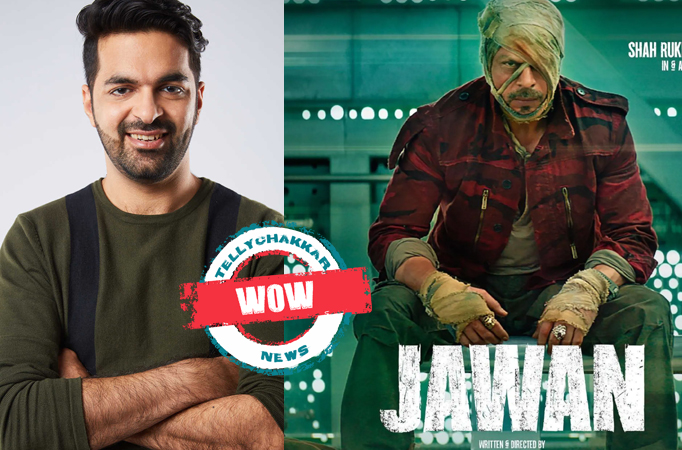
MUMBAI: Shah Rukh Khan’s upcoming film Jawan, directed by Atlee Kumar and co-starring Nayanthara, Vijay Sethupathi, Deepika Padukone, Sanjay Dutt and more has opened to a thunderous advance booking internationally, three weeks prior its release. After the super success of Pathaan, SRK fans are eager to see the actor in his action avatar once again. The film has reached the amazing feat of Rs 1000 crores.
Also Read-Wow! Jawan sees remarkable advance sales three weeks prior to the release
Of Course, apart from the incredible storyline, screenplay and performances, Jawan also has some kickass dialogues that will stay with the fans for a long time. Talking about writing the dialogues, Sumit said, “The idea was to stay true to the world of the film and write dialogues accordingly, not try to be smart and show off. If the lines are working, it is because they are well within the context of Jawan.”
Sumit breaks down about the 7 most loved lines from Jawa;
“jab main villain banta hu na, toh mere saamne koi hero tik nahi sakta…”
“The metro sequence was the first scene I wrote. While writing it, I started to feel that I’m enjoying it, that I could do it well. Azad is putting on a persona in that sequence, and it is completely unhinged. Because it’s a persona, you can go anywhere with it but there still needs to be a character continuation. Azad is catering to an audience in the metro. So the idea was to figure out if he was a quirky, mad villain. The line was what gave me an in into the film, that this is the kind of fun I want to have with it.”
Voting monologue
“It was the whole finger juxtaposition, with raising questions and voting. Once I cracked that ‘ungli’ concept, it was like we can do the monologue, we need to express what Azad has been doing so far and what he wants to say to the people. But how will he say it? What will be the tool he will use to express himself? I thought about it for days and then I finally cracked the ungli idea, I felt it was a good connection that you raise finger to ask question and also to vote. It just fell into place very seamlessly.”
Sumit further added, “It was an important scene because Azad is finally explaining why he is doing what he is doing. So far, he was donning various avatars—bald man, white long hair, half mask—but in this moment he is finally coming out with his truth. It was the most important piece of dialogue in the film. The whole idea was that he must have thought about this moment and what he plans to say. So, it had to be written with the correct emotion and punch in a way that it doesn’t get boring, because monologues can.”
“Vikram Rathore, naam toh suna hoga”
We knew that once Vikram Rathore has come and has smashed all the goons, we wanted to end it with a good punch before the interval. So when Eijaz Khan asks him, ‘Tu hai kaun?‘ that was the cue for him to say, ‘Vikram Rathore’. But then I thought he is just saying his name and nothing else, so I remembered the line, ‘Naam toh suna hoga‘. It also goes well because he is aware that he is Kali’s brother, so of course he would’ve heard his name. It was going with the context of the film and again going fully meta! What I liked about it was the opportunity to use a romantic line, ‘Naam toh suna hoga‘ and turn it into a savage line!
“Iss jail mein aadmi tere hai, lekin yeh jail meri auraton ka hai”
“It’s not a typical ‘massy’ line yet it is. When I wrote it I kind of knew that it’s a special line. I had gone to watch the film early morning at Gaiety with Sanya Malhotra—where she also made me dance—and I was happily taken aback when people cheered on that line. You could’ve gone anywhere with that line, maybe said, ‘Is jail mein meri aurtein hai‘ or something. But Azad is raised by women, he doesn’t think he owns this jail nor does he think he owns these women.”
Poetries of Azad and Vikram Rathore
“I loved writing the poem for Azad, ‘Main achcha hu, ya bura hu, punya hu ya paap hu; ye khud se puchna, kyuki main bhi aap hu.’ It is one of my favourite lines after ‘ye jail meri auraton ka hai.’ There’s one poem I wrote separately for Vikram Rathore as well, which Shah Rukh sir posted as part of a special promo.” He added, “Woh anth hai toh main kaal hu, woh teer hai toh main dhaal hu; hu punya-paap se parey, chita se udti aag hu, jo na taley woh shraap hu, main… tumhara baap hu.’ It’s not part of the film, but we did think if we could add it because Azad says a poem in the film before the monologue. I wish the lines were part of the film because I got a lot of texts from fans as well asking me why they were not included!”
Vijay Sethupathi’s climax lines
“He is a phenomenal actor, a dream to work with. I used to sit with him with the lines, he would have his inputs as well. The Santa Claus line is something that is said by Vikram because he has complete white hair and beard…! The other line in the climax, it was there even while writing it. When father and son hug each other, it’s an emotional moment— but it is happening in an action scene with goons around them! Just to make it fun I wrote that line, ‘Koi roko inhein, ab ye gana shuru kar dege!’”
‘Bete ko haath lagane se pehle, baap se baat kar’
“For every dialogue in the film, the idea was that it should fit the context of the movie. As a dialogue writer you can get tempted to write beautiful, flowery lines but for me it’s important that a line fits the context for it to land. Here, Vikram Rathore was getting his memory back and he has to say something to Kali, who is about to hit Azad. The most simple and correct way to say was that, ‘Bete ko haath lagane se pehle baap se baat kar.’ I didn’t want to make it too flowery. The best example is, ‘Mere paas Maa hai.’ It’s such a simple line because it says what it wants to and comes at the right moment in the film. For Vikram Rathore, it was the most simple and emotional thing to say.”
Also Read-Wow! Jawan sees remarkable advance sales three weeks prior to the release
For more news and updates from the world of television, OTT and movies, stay tuned to TellyChakkar.
Credit-IndianExpress


















Add new comment